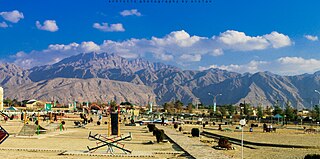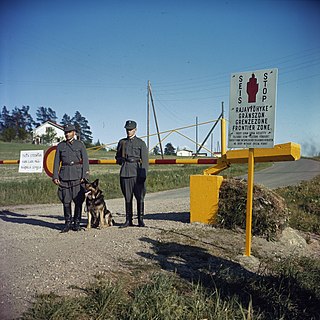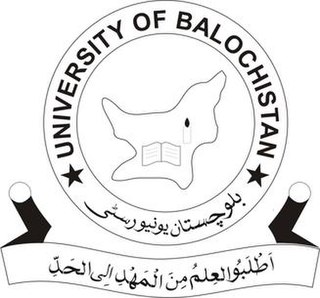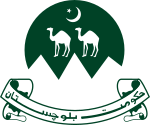
Quetta is the capital and largest city of the Pakistani province of Balochistan. It is the tenth largest city in Pakistan, with an estimated population of over 1.5 million in 2024. It is situated in the south-west of the country, lying in a valley surrounded by mountains on all sides. Quetta is at an average elevation of 1,680 metres above sea level, making it Pakistan's highest altitude major city. The city is known as the "Fruit Garden of Pakistan" due to the numerous fruit orchards in and around it and the large variety of fresh and dried fruits produced there.

Zubaida Jalal, is a Pakistani politician, a teacher, libertarian and social activist, who served as the Defence Production Minister from August 2018 until April 2022.

A border guard of a country is a national security agency that ensures border security. Some of the national border guard agencies also perform coast guard and rescue service duties.

Barkhan is a district in the province of Balochistan in Pakistan. It shares its borders with the province of Punjab to the east and the Balochistan districts of Dera Bugti to the south, Kohlu to the west, Loralai to the northwest and Musakhel to the north. The town of Barkhan serves as the district's headquarters. It was granted the status of a separate district on 31 December 1991, prior to which it was a tehsil of Loralai District.

The University of Balochistan (UoB) also known as Balochistan University, is a public university located in the city center area of Quetta, Balochistan, Pakistan. UoB is the oldest highest education institution in Balochistan, having been established in 1970.

The Government of Sindh is the provincial government of the province of Sindh, Pakistan. Its powers and structure are set out in the provisions of the 1973 Constitution, in which 30 Districts of 7 Divisions under its authority and jurisdiction.

The Government of Balochistan is the provincial government of the largest province of Balochistan, Pakistan in Quetta. The head of the province is the Governor, who is nominated by the President of Pakistan. The chief executive of the Government of Balochistan is the Chief Minister who is elected by the Balochistan Assembly and the administrative head of the province is the Chief Secretary of Balochistan who is appointed by the Prime Minister of Pakistan.

The Government of the Punjab is the provincial government of the Pakistani province of the Punjab. It is based in Lahore, the provincial capital. Its powers and structure are set out in the provisions of the Constitution, in which 41 districts come under its authority and jurisdiction. The government includes the cabinet, selected from members the Punjab Provincial Assembly, and the non-political civil staff within each department. The province is governed by a unicameral legislature with the head of government known as the Chief Minister. The Chief Minister, invariably the leader of a political party represented in the Assembly, selects members of the Cabinet. The Chief Minister and Cabinet are thus responsible for the functioning of government and are entitled to remain in office so long as it maintains the confidence of the elected Assembly. The head of the province is known as the Governor, appointed by the federal government, on behalf of the President. The administrative and executive boss of the province is the Chief Secretary Punjab and they head all the provincial departments and the provincial cabinet.

The Anti-Narcotics Force is a federal executive bureau and a paramilitary force of the Government of Pakistan, tasked with combating the narcotics smuggling and use within Pakistan. ANF works under the umbrella of Pakistan Army and Ministry of Narcotics Control (Pakistan) of which Mohsin Raza Naqvi is the minister since March 2024. Due to misconception on Section 4 of ANF ACT 1997, the force's head consisted of the active-duty general officer of Pakistan Army. Although the law prescribes that any competent person may be appointed as Director-General. Currently, a two-star Army Officer, Major general Muhammad Aniq Ur Rehman Malik is deputed as Director-General. The ANF also has sole responsibility for coordinating and pursuing Pakistan narcotics investigations abroad.
Law enforcement in Pakistan is one of the three main components of the criminal justice system of Pakistan, alongside the judiciary and the prisons. The country has a mix of federal, provincial and territorial police forces with both general and specialised functions, but the senior ranks of all the provincial forces and most of the federal ones are manned by members of the Police Service of Pakistan (PSP). The PSP is one of the most prestigious part of the Central Superior Services, Pakistan's main civil service organisation. Federal law enforcement agencies are generally overseen by the Ministry of Interior of the Government of Pakistan, while provincial police forces are overseen by a department of the government of that province.

The following outline is provided as an overview of and topical guide to Pakistan:

The Ministry of Environment, was a Cabinet-level ministry of Government of Pakistan, tasked and primarily responsible for planning, coordinating, promoting, protecting and overseeing the policy implementation of government sanctioned environmental and forestry programmes in the country. Its government activities included conservation, survey of fauna, flora, forestry, wildlife ; protection and prevention of pollution control, afforestation, and land degradation mitigation. The MoE was also responsible for administrating and establishing the National Parks of Pakistan.

The Governor of Balochistan is the head of the province of Balochistan, Pakistan. The post was established on 1 July 1970, after the dissolution of West Pakistan province and the end of One Unit. Under Pakistan's current parliamentary system, the governorship is a ceremonial position, as a symbol of the federation. The governor is appointed by the centre, whereas the principal head of the provincial government remains the elected Chief Minister of Balochistan.

The Ministry of National Health Services, Regulation and Coordination is a cabinet level ministry of the government of Pakistan with responsibility for national public health.

Abdul Malik Baloch is a politician and served as the 21st Chief Minister of Balochistan, Pakistan from 7 June 2013 to 23 December 2015. He was born in Turbat District, Makran and he is a member of the Hooth tribe.

The Sindh Health Department is the provincial department that oversees healthcare for the Pakistani province of Sindh. Several are held responsible for running the department including a cabinet minister and health secretary which are members of the Government of Sindh.
The Punjab Health Department is a government agency of Punjab, Pakistan that delivers preventive healthcare, as well as curative care health care services from the primary health care level to the tertiary care level.

The Ministry of Kashmir Affairs & Gilgit-Baltistan is a ministry of the Government of Pakistan. It handles the regional affairs of Azad Jammu and Kashmir and Gilgit-Baltistan as both territories of Pakistani-administered Kashmir do not have regular provincial status within Pakistan due to political circumstances revolving around the long-running Kashmir conflict.
The COVID-19 pandemic in Pakistan is part of the pandemic of coronavirus disease 2019 caused by severe acute respiratory syndrome coronavirus 2. The virus was confirmed to have reached Pakistan on 26 February 2020, when two cases were recorded. On 18 March 2020, cases had been registered in all four provinces, the two autonomous territories, and Islamabad Capital Territory, and by 17 June, each district in Pakistan had recorded at least one confirmed case of COVID-19.

The Civil Armed Forces (CAF) are a group of nine paramilitary, uniformed organisations, separate and distinct from the regular "military" Pakistan Armed Forces. They are responsible for maintaining internal security, helping law enforcement agencies, border control, counter-insurgency and counter-terrorism, riot control, and anti-smuggling under the Ministry of Interior. They frequently operate alongside the Pakistani military in response to natural disasters. During times of war they can have their command transferred to the Ministry of Defence, and effectively combined to form a reserve force for the Pakistani military.














